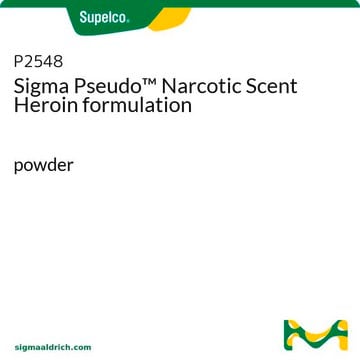W276212
Myrcene
sum of isomers, ≥90%, natural, FG
Synonym(s):
β-Myrcene, 7-Methyl-3-methylene-1,6-octadiene
About This Item
Recommended Products
biological source
botanical
Quality Level
grade
FG
Fragrance grade
Halal
Kosher
natural
Agency
follows IFRA guidelines
reg. compliance
EU Regulation 1223/2009
EU Regulation 1334/2008 & 872/2012
FDA 21 CFR part: 172.510
vapor density
4.7 (vs air)
vapor pressure
~7 mmHg ( 20 °C)
Assay
≥90%
greener alternative product characteristics
Less Hazardous Chemical Syntheses
Use of Renewable Feedstocks
Learn more about the Principles of Green Chemistry.
sustainability
Greener Alternative Product
refractive index
n20/D 1.469 (lit.)
bp
167 °C (lit.)
density
0.791 g/mL at 25 °C (lit.)
application(s)
flavors and fragrances
Documentation
see Safety & Documentation for available documents
food allergen
no known allergens
fragrance allergen
limonene (sum of D, L and DL)
greener alternative category
Organoleptic
balsamic; herbaceous; woody
storage temp.
2-8°C
SMILES string
C\C(C)=C/CCC(=C)C=C
InChI
1S/C10H16/c1-5-10(4)8-6-7-9(2)3/h5,7H,1,4,6,8H2,2-3H3
InChI key
UAHWPYUMFXYFJY-UHFFFAOYSA-N
Looking for similar products? Visit Product Comparison Guide
General description
Application
- Selective Reactivity of Myrcene for Vat Photopolymerization 3D Printing and Postfabrication Surface Modification.: This research highlights the selective reactivity of myrcene in vat photopolymerization for 3D printing, demonstrating its potential in creating functionalized surfaces for biomedical applications (Weems et al., 2020, Biomacromolecules).
- Inverse Vulcanization of Sulfur using Natural Dienes as Sustainable Materials for Lithium-Sulfur Batteries.: This article explores the use of myrcene and other natural dienes in the inverse vulcanization of sulfur, promoting sustainable materials for lithium-sulfur batteries (Gomez et al., 2016, ChemSusChem).
Signal Word
Danger
Hazard Statements
Precautionary Statements
Hazard Classifications
Aquatic Acute 1 - Aquatic Chronic 1 - Asp. Tox. 1 - Eye Irrit. 2 - Flam. Liq. 3 - Skin Irrit. 2
Storage Class Code
3 - Flammable liquids
WGK
WGK 3
Flash Point(F)
111.2 °F - closed cup
Flash Point(C)
44 °C - closed cup
Regulatory Listings
Regulatory Listings are mainly provided for chemical products. Only limited information can be provided here for non-chemical products. No entry means none of the components are listed. It is the user’s obligation to ensure the safe and legal use of the product.
PRTR
Class II Designated Chemical Substances
FSL
Group 4: Flammable liquids
Type 2 petroleums
Hazardous rank III
Water insoluble liquid
ISHL Indicated Name
Substances Subject to be Indicated Names
ISHL Notified Names
Substances Subject to be Notified Names
JAN Code
W276212-BULK-K:
W276212-SAMPLE-K:
W276212-VAR-K:
W276212-100G-K:
W276212-1KG-K:
Certificates of Analysis (COA)
Search for Certificates of Analysis (COA) by entering the products Lot/Batch Number. Lot and Batch Numbers can be found on a product’s label following the words ‘Lot’ or ‘Batch’.
Already Own This Product?
Find documentation for the products that you have recently purchased in the Document Library.
Our team of scientists has experience in all areas of research including Life Science, Material Science, Chemical Synthesis, Chromatography, Analytical and many others.
Contact Technical Service










